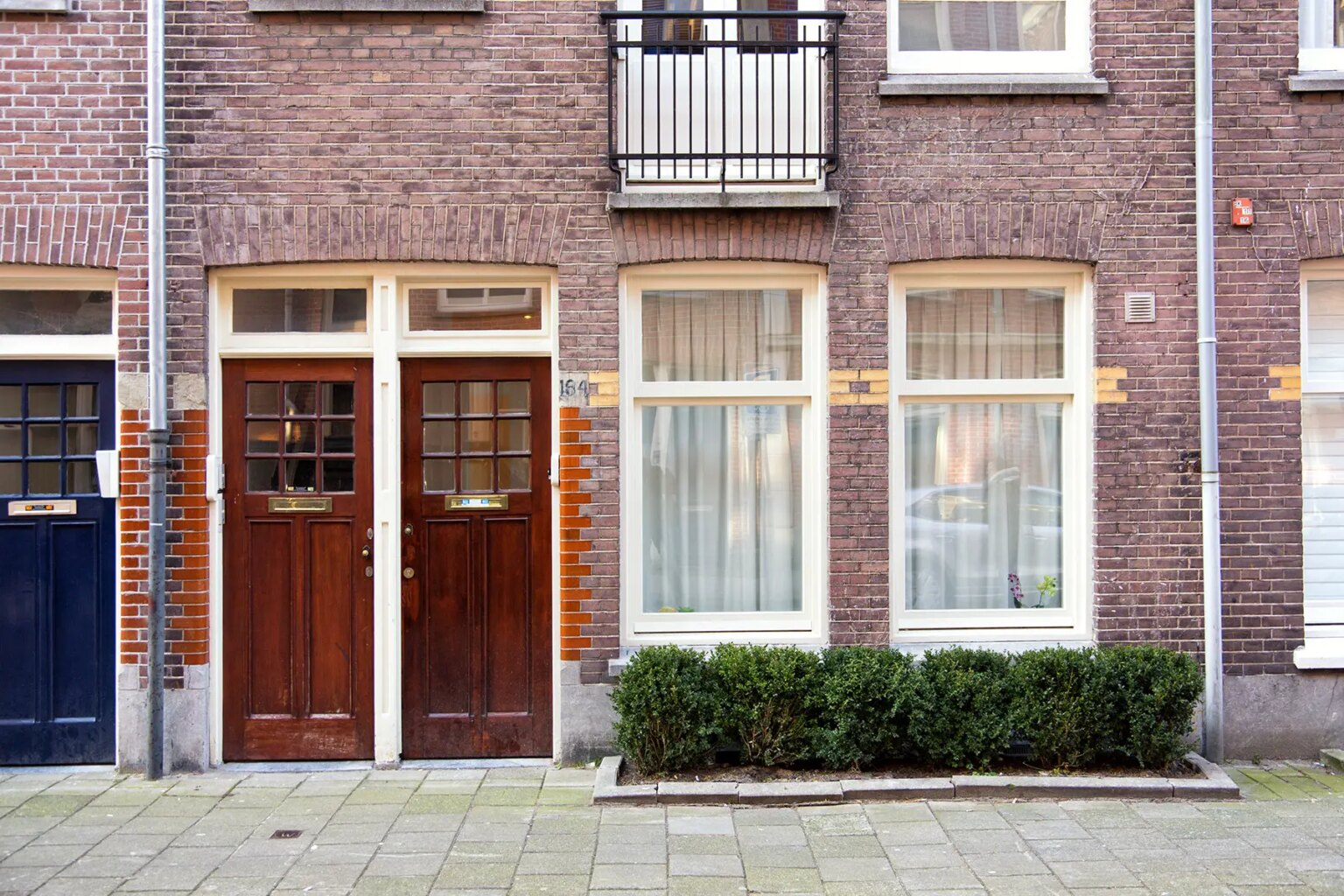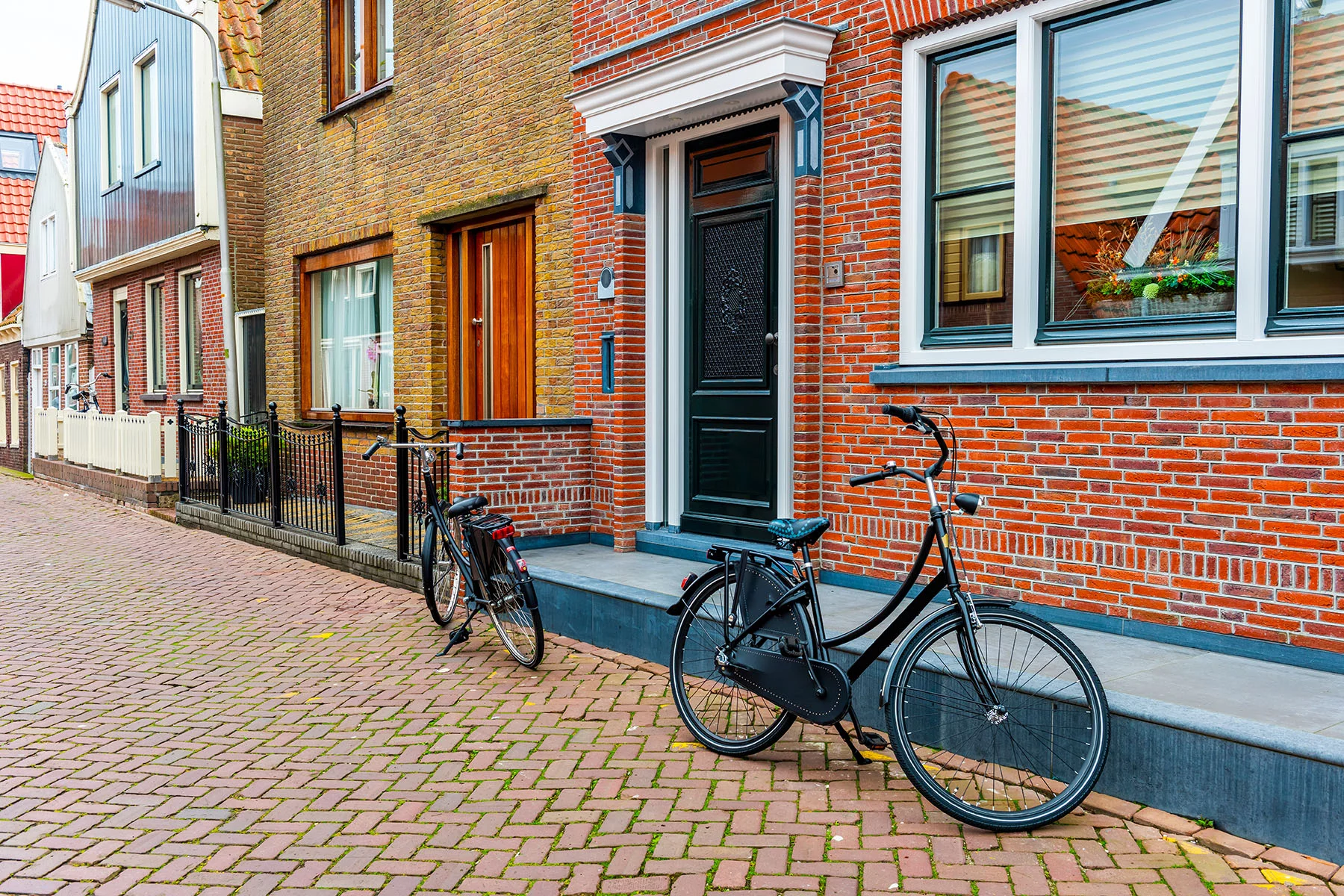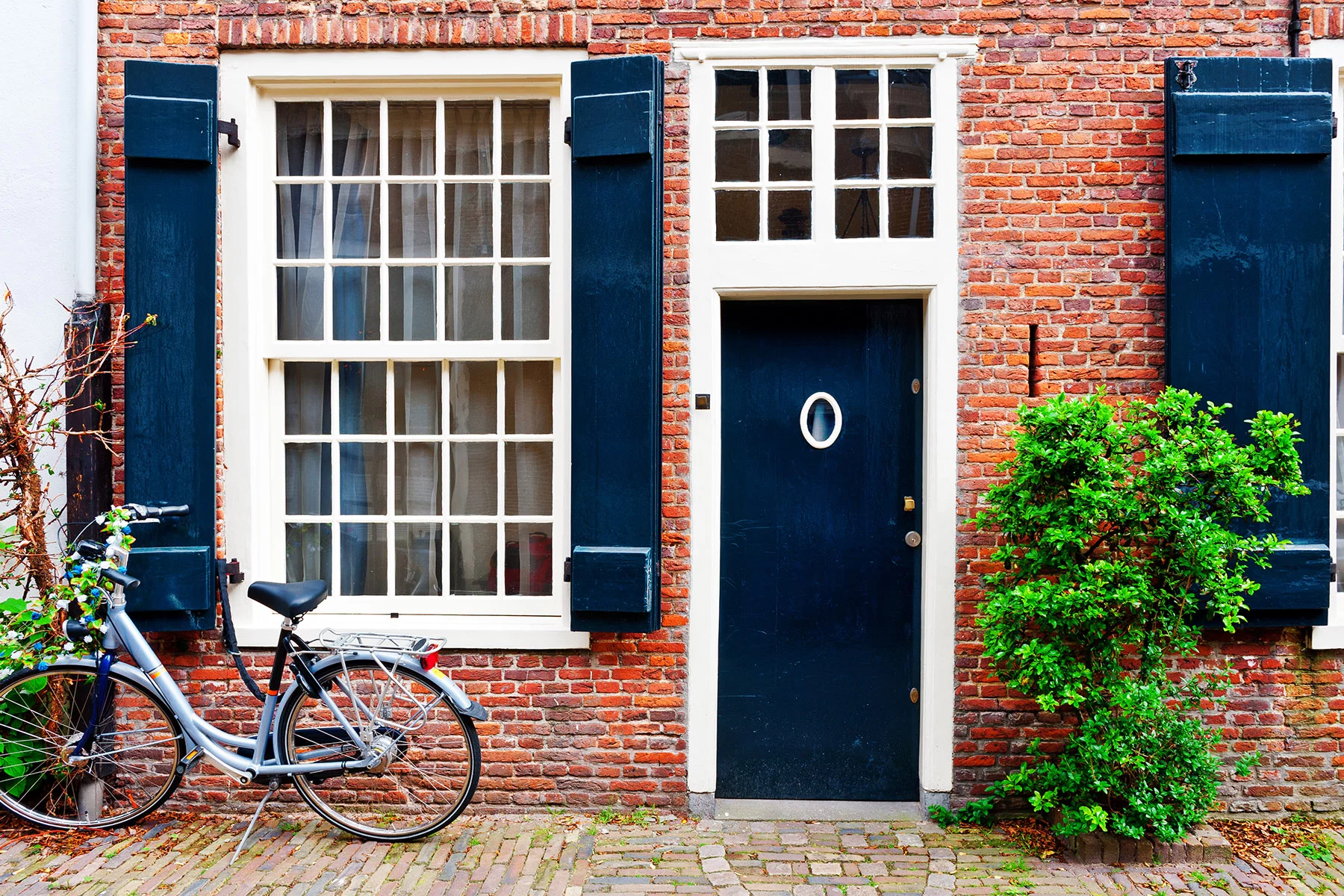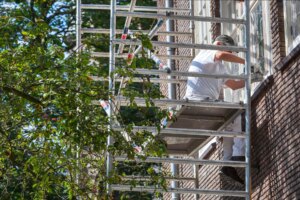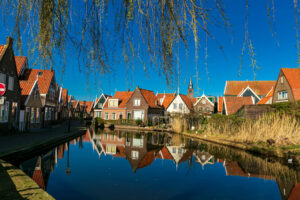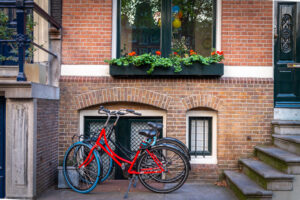Deciding to buy a new or first home is a milestone that’s both exciting and scary. It can be all the more daunting if you’ve just moved to the Netherlands and haven’t quite figured out the Dutch quirks and terms.
We’re here to unravel the jargon and guide you through the process of buying a property in the Netherlands, from finding a suitable house to signing legal documents. You’ll be moving in before you know it.
Here’s what you need to know about the subject:
- Homeownership in the Netherlands
- Should you buy or rent property in the Netherlands?
- Can expats buy property in the Netherlands?
- The Dutch property market and property prices
- Cost of buying a property in the Netherlands
- Financing a property purchase in the Netherlands
- Finding a property in the Netherlands
- The process of buying a property in the Netherlands
- Moving into your Dutch property
- Buying a new-build home in the Netherlands
- Buying land to build a new property in the Netherlands
- Selling a property in the Netherlands
- Tips on buying a home in the Netherlands
- Useful resources
ING
Trust ING for your banking in the Netherlands. ING provides a wide range of services, including bank accounts, savings, loans, investments, insurance, and more. With tools to compare and calculate your options, they help you make the right financial decisions. Visit ING online and let your money go further.
Homeownership in the Netherlands
In 2020, 69.1% of the Dutch population were homeowners. For comparison purposes, this figure is quite low for European standards; homeownership in the Netherlands is significantly more common than in neighboring Germany (50.5%) but less than in Belgium (71.1%).
Property prices have risen sharply in recent years due in part to a housing shortage in the main cities – Utrecht, Amsterdam, Rotterdam, and The Hague. However, mortgage interest rates remain low, with some providers offering 100% mortgages.
Should you buy or rent property in the Netherlands?
Dutch house prices are high, and the additional costs of buying a home in the Netherlands can add up. Despite this – and the fact renting remains common – owning a home in the Netherlands usually makes good financial sense in the long term.
Tax benefits for homeowners mean that mortgage costs are often lower than rent. This is especially true as rental prices increase each year. However, you’ll need to assess the market on an area-by-area basis and decide whether it’s prudent to buy now – as transaction costs and high prices in the major cities can tip the balance.
On the other hand, there are benefits to renting. You’ll have greater freedom if you are planning to move again, less responsibility in terms of maintenance costs and of course, fewer upfront costs which can be risky. Additionally, there are some restrictions on homeowners, including needing to be a resident of the Netherlands, which might make it difficult to buy.
Can expats buy property in the Netherlands?
The short answer is yes. The Netherlands does not place any restrictions on the purchase of property by foreigners, whether resident or non-resident. However, to get a mortgage you must live and be registered in the Netherlands.
If you are from a country in the EU, EEA or Switzerland you do not need a visa to live or work in the Netherlands. Nevertheless, you will need to apply for a residence permit and a national identification number – called a BSN. Be aware that you can only apply for permanent residence in the Netherlands after living in the country for five years and some banks may not provide non-permanent residents a mortgage covering the highest percentage of the purchase price.
As with Dutch citizens, certain additional costs related to buying a home in the Netherlands are tax-deductible, providing it is your primary residence. The most notable of these tax-deductible costs are your mortgage repayments. On the other hand, the value of your house affects the rate of tax you pay. Luckily this tax increase is far less than the deductions available.
Expats taking out a mortgage can also benefit from the 30% tax ruling in the Netherlands. File your taxes and register for tax deductions at the Dutch tax authority: Belastingdienst. For all things tax-related visit our guide to the Dutch tax system.
The Dutch property market and property prices
House prices in the Netherlands have risen significantly in the last few years. Prices skyrocketed in 2018, especially in Amsterdam, Utrecht, and The Hague, and are likely to keep rising. This is partially due to the housing shortage affecting the main cities.
There are significant differences in property prices between different areas of the Netherlands. In 2019, the average home in the province of Groningen was €213,000. This is much lower than in Noord Holland, the province home to Amsterdam and Haarlem, where the average price was €388,000.
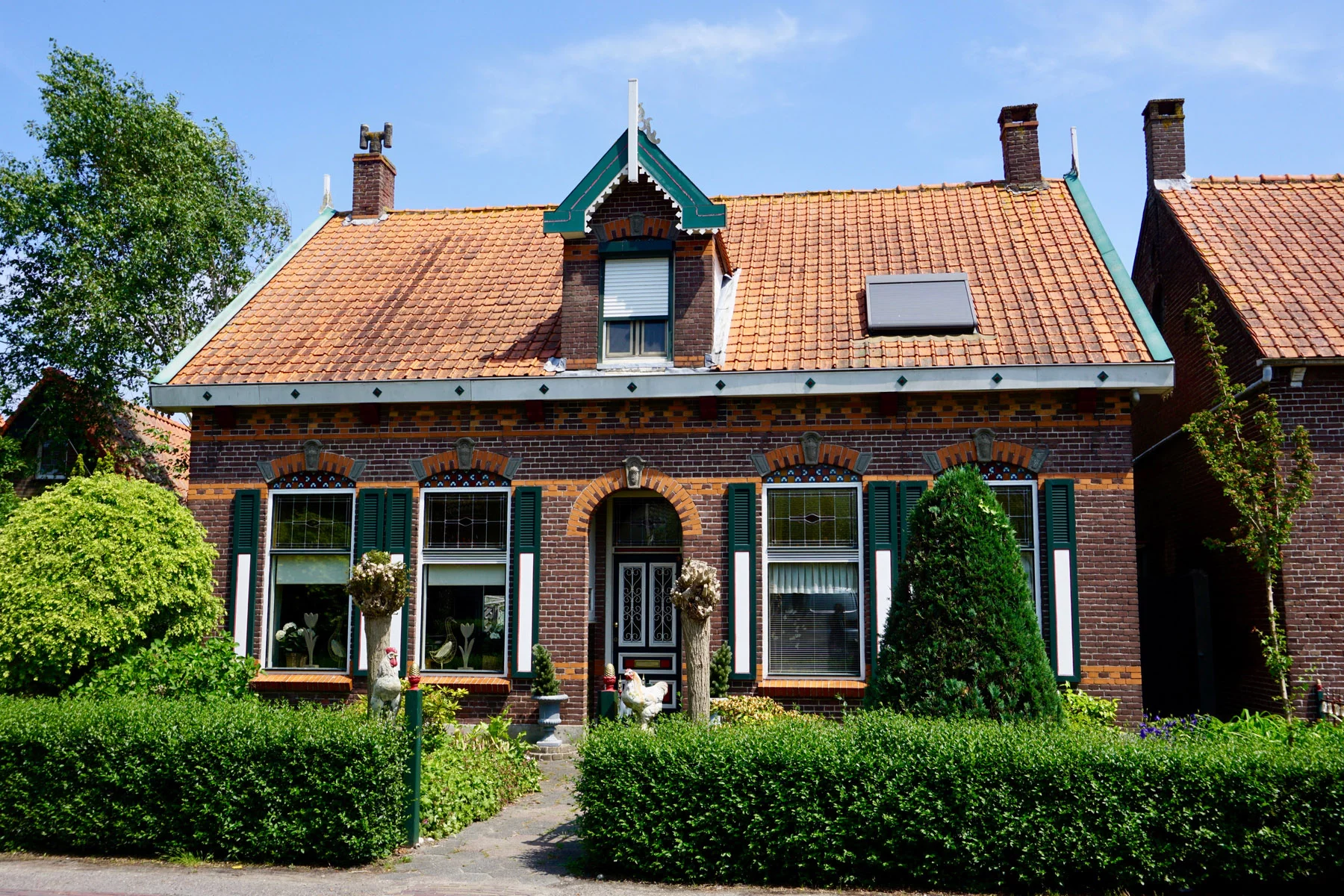
However, the gap is closing and the rate of increase in Amsterdam has begun to drop. In addition, there are plans for over one million new builds throughout the country by 2035. Half of these are planned to be completed by 2025.
According to ABN AMRO bank, rising prices are affecting the lower end of the market the most, making it more difficult for first-time buyers. That said, economists report that the annual rise has slowed from 7% in 2018 to 4% in 2020.
Cost of buying a property in the Netherlands
As well as the price of the property itself, there are other factors to consider when working out the costs of buying a home in the Netherlands. Some of these are compulsory and others are recommended.
Wise
Buying a property abroad is a big step and involves important financial decisions. Wise, an international money transfer company, provides specialist support to help you navigate large international transfers and save on exchange fees. Fill out Wise’s online form today to find out how they can assist you.
In general, the fees for various services are calculated in relation to the value of the property plus VAT (BTW in Dutch) and have to be paid before any exchange can happen. The major upfront cost to consider, which must be paid if you back out of the contract without a valid reason, is the 10% pre-sale deposit (Koopovereenkomst waarborgsom). This amount is deducted from the house price on completion.
Additional costs include:
- Transfer tax – Overdrachtsbelasting: 2% of the purchase price;
- Transfer contract – De leveringsakte: 0.3% (plus BTW) of the purchase price;
- Mortgage arrangement – Hypotheekadvies: 1% of mortgage or 1.2 % (plus BTW) of purchase price;
- Mortgage contract – Hypotheekakte: 0.15% (plus BTW) of the purchase price, tax-deductible;
- Estate agent fee – Makelaarscourtage: 2% (plus BTW) of the purchase price;
- Valuation – Taxatierapport: 0.2% (plus BTW) of the purchase price, tax-deductible;
- Other set costs include Notary and Land Registration Fees
In addition, the deemed rental value (Eigenwoningforfait) – from 0% to 0.7% of rental value – will be determined by the government and added to your income.
Overall, these extra costs add up to approximately 5–7% of the purchase price, assuming a mortgage is needed. To put these costs into perspective, a home that is bought for €200,000 will end up costing around €212,100. It is important to allow for these additional but unavoidable costs when setting your budget. This does not take into account any renovation or maintenance costs that you might want to consider.
Financing a property purchase in the Netherlands
Buying a home in The Netherlands is a big financial step. Most people do not buy their home outright. Instead, they take out a mortgage: a loan from the bank set against the property, with a trusted bank like ING.
Mortgages
Mortgage interest rates are at an all-time low and some banks may offer 100% mortgages. Nevertheless, you will usually be limited to a 90% mortgage. There are a number of options when it comes to the type of Dutch mortgages, but the most popular is a linear mortgage (lineaire hypotheek) and an annuity or repayment mortgages (annuïteiten hypotheek). It is recommended that you get a mortgage advisor to help you find the right choice for your financial situation.
ABN AMRO
Are you an expat looking to buy a house in the Netherlands? While the process may be different from what you’re used to, ABN AMRO is here to help. You can use their online mortgage calculator or make an appointment with a mortgage advisor. With ABN AMRO, buying a house may be much easier than you thought.
As of June 2023, Dutch mortgage rates from the major banks are as follows (based on a maximum loan-to-value of 100%).
- Five-year fixed mortgage: 4.41–4.76%
- 10-year fixed mortgage: 4.31–4.66%
- 20-year fixed mortgage: 4.55–5.04%
As a non-Dutch citizen, you have the same formal rights when it comes to applying for a mortgage. That said, if you are new to a job, self-employed, on a low income, or of a non-EU nationality it may be harder to get a loan. You must also be resident in the Netherlands and registered with the municipality (gemeente).
Each bank is different, but if you are an EU citizen usually they expect:
- A valid passport
- A BSN (citizen service number)
- And proof of permanent employment in the Netherlands or proof of income
- For temporary workers or PhD students: a statement from your employer (werkgeversverklaring)
Mortgage advisors and banks working with expats
Many expats looking to buy property in the Netherlands use a mortgage advisor to help them through the process. While there are many Dutch advisors, there are also a number of expat mortgage advisors in the Netherlands. This is especially useful if you don’t speak Dutch or are new to the Dutch property market.
Expat-friendly banks and mortgage brokers in the Netherlands include:
Assistance schemes
Unfortunately for those looking to make the first step on the property ladder, there are no specific financial schemes for first-time buyers. However, since 2013, the Dutch government has eased mortgage conditions to make the costs of buying a home in the Netherlands more accessible for first-time buyers.
These changes concern primarily the National Mortgage Guarantee – (Nationale Hypotheek Garantie –NHG) – a scheme that guarantees repayment of a mortgage in cases where the borrower becomes unable to. The premium for the National Mortgage Guarantee (NHG) decreased from 0.9% to 0.7% in 2020. This means savings of up to €620 for buyers. The maximum price of a house eligible for the NHG has also risen to €310,000, and up to €328,600 if the home meets certain energy-saving standards.
Finding a property in the Netherlands
From websites to property agents, there are many ways to search for your dream Dutch home.
Property websites
There are a huge number of property websites where you can begin the search for your new home. Popular national sites include:
- Expatica – in English
- Funda – this is the biggest Dutch property site and is available in English
- Huislijn – in Dutch
- Jaap – in Dutch
- Pararius – available in various languages
- Zoekallehuizen – in Dutch
There are also many other sites specific to a particular city.
It is a good idea to use these sites to get an idea of the market in your desired areas, even if you decide to use another means of buying a house. To stay on the ball, you can also receive daily emails with a selection of new properties. If you spot something you like, you can then call the real estate agent or owner listed to make an appointment to see the property. As demand is high, often this means you have to move fast.
Some alternative methods of searching for a new house are:
- Newspapers: All Dutch papers have a property section. De Telegraaf has a housing supplement on Wednesdays (in Dutch)
- Network: engage your network to keep an eye out for new properties
- Looking around a location: as well as getting a feel for the area, you can look out for Te Koop (for sale) signs on interesting properties
Property agents
While it is not a legal requirement, in general it is recommended to go through a property agent (makelaars) when buying a property in the Netherlands. Property agents can do the search and initial screening of a property, and handle negotiations, notary meetings and arrange the sale contract. Some are aimed at easing the transition for expats, and offer a full-service from finding you a house to helping you furnish it. However, with so many agents to choose from, you may want to use a real estate comparison platform such as Juiste Makelaar. Here, you’ll be able to choose the qualities you’re looking for in a realtor and connect with the agents themselves.
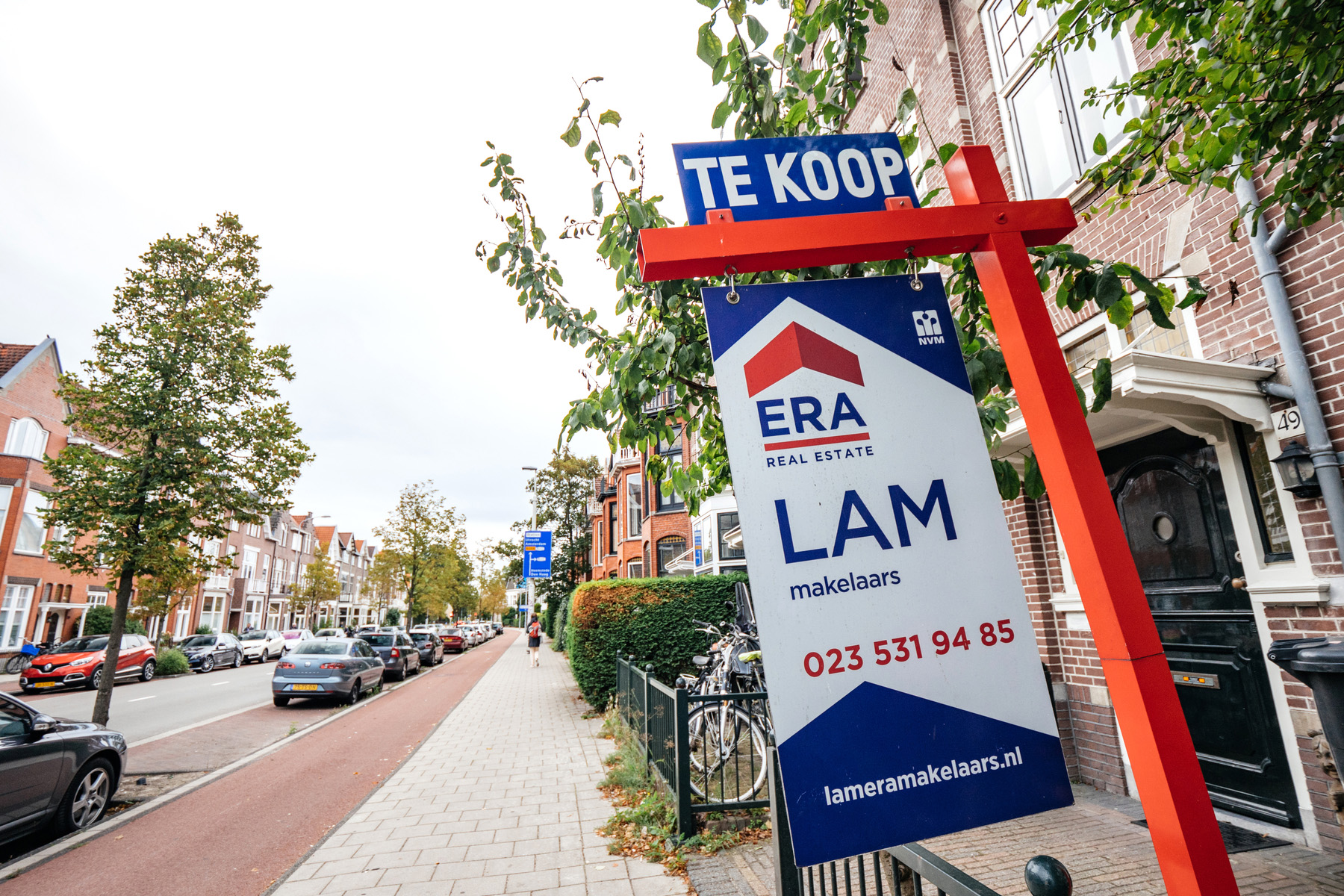
The websites above will list estate agents for each property, and agents usually also have their own website where some properties are listed. You can also visit in person to discuss your options. Many real estate agents in the Netherlands specialize in helping expats find homes, including Homes for Expats.
It’s handy to know that property agents in the Netherlands act as a purchase broker (aankoopmakelaar) or a selling broker (verkoopmakelaar), but never as both. This ensures they have their client’s best interests at heart. The NVM is the Dutch Association of Real Estate Brokers and Experts, and over 75% of dutch property agents are registered here, so it is a good guarantee of quality. Funda has an extensive directory of NVM-registered agents.
Advantages of using a property agent
- They have in-depth knowledge of the legal elements so you don’t get taken advantage of
- Agents can help you translate and act as a mediator between you and the seller – buying a new home can be a challenging experience
- They can arrange technical surveys – to spot potential problems and accompany you on house visits
- Agents will help you to negotiate and get the best deal. With such a competitive market in the Netherlands, often you will have to make offers higher than asking price to be in with a chance. Agents can help you to decide how much higher
- They can advise on areas that might be new to you, or good to invest in
- They can help you find an independent mortgage adviser
On the other hand, the cost of enlisting a property agent can be very high. Fees are usually 1–2% of the property price, although this can be higher with full-service agents. Make sure to ask about costs upfront to avoid nasty surprises. You should also expect to sign a contract with your agent – and these are often exclusive. This means you may be charged the agent’s fee even if you find a property yourself or decide not to buy.
Weighing up these factors, it may be that you want to deal with the owner directly. In this case, make sure you know all the legal requirements of buying and selling property in the Netherlands, so you don’t get ripped off.
Viewing and choosing a property
However you go about it, once you have found a property you like, you should contact the owner or the agent to organize a viewing. Usually, this can only take place between business hours (9 am – 5 pm) with an agent, so it can mean taking time off work to visit the property. Due to the housing shortage, homes in popular areas go very quickly, so it is important to act fast.
Of course, the rules change if the property is a new-build and still under construction. In this case, you can see digital images of the property online, but it is definitely recommended that you use a buying agent to help you understand the specifications, facilities and the contract, as well as to determine the expected value of the property.
Things to consider when choosing a property
- Location – is buying in the area a good investment? What are the transport links, local facilities and schools like?
- Quality of the property – check closely for any damage or mold. Get a structural survey to get the full picture
- Is it a listed building? – Building restrictions will apply, but there may also be tax breaks
- Fixture and fittings – what is included or not included? Most Dutch houses are sold unfurnished
- Type of contract – is an escape clause included in the event that the property or seller doesn’t meet certain requirements?
Buying an apartment
Some important Dutch quirks to take into account when buying an apartment:
There is a difference between a single-family home and an apartment. In an apartment building Association of Owners (VVE) share ownership of the building (VvE Vereniging van Eigenaren) (owners association) and own the apartment – responsible for the upkeep of the building/communal areas with other owners – monthly payments/pot.
However, VvEs are notorious for getting into debt or being poorly run and can make decisions on structural issues difficult. It is a good idea to check the terms and conditions of the property division regulations (splitsingsreglement) before you buy.
Especially in the big cities, the property may also come with a leasehold (erfpacht), which means that you must pay an amount to be able to use the land. You usually pay this per year.
The process of buying a property in the Netherlands
Making an offer
Once you have found a suitable property, the negotiations can begin. Usually, an agent will only negotiate with one seller at a time, making one offer to the buyers.
If you are interested, but not able to make an offer you may be able to arrange the first refusal on the property, giving you a few days in which others cannot make an offer. This gives you time to find out how much you can borrow or to carry out a building survey. However, sellers are not always willing to offer the first refusal.
You are not obliged to offer the asking price. Although it may seem savvy to offer less than the asking price initially, the reality is that with the housing shortage many buyers will offer over the asking price even with the first offer. Check the Land Registry (kadaster) for house prices in the area. A property agent can help you to negotiate the best option.
Arranging an appraisal and survey
Although not required when buying a home in the Netherlands, you will need an appraisal report (taxatierapport) to obtain a mortgage. Such an appraisal is carried out by a valuer (taxateur). You will have to pay for this. If you’re looking for a local appraiser, HuisAssist is a great choice to compare your options.
A structural survey is also a good idea as part of the contract. An independent expert will identify any potential problems and give you an estimate of the repair costs. This could result in you negotiating a lower purchase price.
Hiring a notary
Buying a home in the Netherlands is safeguarded by legal processes. A notary (notaris) acts as a legal mediator between seller and buyer, drawing up the deeds to sign. A notary is necessary for the sale of houses in the Netherlands. They will investigate whether the property can be sold by the seller, the registration in the Land Registry and other legal requirements. They also discuss the mortgage deed with you, and update the Land Registry and mortgage register with your name.
You choose your own notary when buying property in the Netherlands. At notaristarieven.nl and notaris.nl you can find out more about what the notary does (in Dutch) and you can compare prices for different services on HuisAssist. You can also ask your property agent to advise you.
Independent evaluation of notaries is overseen by the KNB The Royal Dutch Association of Civil-law Notaries.
Exchanging contracts
Negotiations also cover aspects including the closing date, the price for movable items you are willing to buy, and other conditions for the seller.
Important contingency to take into account include:
- A financing clause (financieringsbeding) that will allow you to withdraw if you cannot raise the required mortgage
- National Mortgage Guarantee
- Penalty clause in case either party decides not to go through with the sale
Once you have agreed on the terms, they will be set out in a preliminary purchase contract with contingencies (voorlopige koopovereenkomst met ontbindende voorwaarden). Even though this is preliminary, the contract means you are committed to the purchase, unless the conditions are not met on either side.
There is a legally mandated 72-hour cooling-off period when buying a home in the Netherlands. This means that after you sign the pre-sale contract you can change your mind within this period without incurring a penalty.
Organizing your finances and paying fees
The preliminary purchase contract usually requires that you or your mortgage provider transfer 10% of the purchase price to the seller’s notary as a deposit (waarborgsom). If you back out of the contract without a valid reason, this deposit will be transferred to the seller. Remember that if the bank has paid the deposit, you will be required to transfer this amount to them. You will also have to pay for a bank guarantee, which depends on the deposit amount.
If you have income from different countries or in various currencies, this may seem like a more complicated step in the process of buying a home. However, you have many options when it comes to purchasing property in the Netherlands.
If you currently live in the country, you can open a domestic bank account. If you do not, you may want to speak to a financial advisor or consider a specialized money transfer service that can help you send money from a bank account outside the Netherlands to purchase your property.
Wise, for example, has a specialist team to help move large transfers abroad and can save you money on exchange fees.
Completing the sale
On the closing date you will visit the property with the seller’s estate agent. Your property agent can also accompany you. During this visit, you should check that the home has been left as agreed. This will also include gas and electricity meter readings. If everything is in order you will sign the transfer deeds at the notary with the seller, making you the legal owner. Here you will also sign the mortgage deeds.
After shaking hands, you will get the keys and be able to move into your new home.
Final arrangements
If you are moving in with your partner you may also want to set out a cohabitation agreement (samenlevingscontract) while you are at the notary. As non-married or non-registered partners have less legal protection in the Netherlands, it is important to arrange the main issues yourself, such as the financial contributions or ownership for the property.
It is common practice in the Netherlands to sell houses unfurnished, including without floors, although this depends on the movable goods agreement. This means you may also need to do some renovations or DIY before you can move in properly.
You can then register your new address with the Gemeente. See our guide to moving to the Netherlands to find out how.
Moving into your Dutch property
So, you have completed the sale and got the keys to your new Dutch home. What next?
Insurance
Homeowners insurance (woonhuisverzekering) is not compulsory in the Netherlands. However, you may need to prove you have it when taking out a mortgage. Banks like ABN AMRO often offer a discount if you take out both your mortgage and home insurance with them. A standard policy covers fire, storm, flood, and theft, although the criteria can vary.
If you buy an apartment, the Association of Owners (VVE) generally arranges a home insurance plan, and the costs are shared equally.
Contents insurance (inboedelverzekering) is also recommended. This usually covers furniture, glass breakage, and general contents. A high-value contents policy (kostbaarhedenverzekering) will be needed to cover for rare or expensive possessions. Many insurance companies will offer a discount if you can present a BORG certificate – to show your property has adequate protection against burglary and certified security equipment installed. Providers of home and contents cover in the Netherlands include:
You can compare home contents policies using a reputable price comparison website. Find out more with our guide to home insurance in the Netherlands.
Utilities and telecommunications
Sometimes you can arrange to get utility services, including gas and electricity, transferred into your name from the previous owner when buying a home in The Netherlands. However, it’s wise to compare suppliers, to check if they offer renewable energy options or who the main provider is in the area. For more information, read our guide setting up utilities in the Netherlands.
Buying a new-build home in the Netherlands
With around 50,000 new homes being built each year, the new-build market is popular, especially in and around the major cities. When buying a new-build or an apartment in a block still under construction, the process is different to buying a pre-owned home. In this case, you will be buying from the project developer. You can either make a bid on a new house of your choice or pay a fixed price and enter a lottery for an apartment in a building.
Both Funda and Nieuwbouw Nederland provide information on what kinds of houses are being built at which locations. You can also find the websites of project developers that contain more detailed information. The construction time of a new house in Amsterdam, for example, is around 2–3 years.
As the buyer, you will get the opportunity to inspect the house before completion to see if all the agreements have been met. However, to avoid getting scammed, it is strongly recommended that you employ a purchasing agent when building a new-build. They can make an estimate of an appropriate price and check blueprints, facilities and other purchase and building agreements.
Buying land to build a new property in the Netherlands
Buying land to self-build your new home is also a popular option in the Netherlands. In 2018, the average cost of building a new house to live in was just below €300 per cubic meter.
Frameworks and regulations can be found at the Department of Housing, Spatial Planning, and the Environment (VROM). The Makelaarsvereniging Amsterdam (MVA) also has lots of useful information on buying land or new-builds in The Netherlands.
Selling a property in the Netherlands
As with buying a house, it is generally recommended to go through an estate agent to sell your property. They can help you get the best price and ensure that the contract is fair for you. As a seller, you are legally obliged to give enough information regarding the property to be sold, including any defaults.
Tips on buying a home in the Netherlands
- Know your budget: make an appointment with a mortgage adviser. A mortgage calculator like the one from Expat Mortgages can be a handy estimation tool, but rules can be different for expats. Make sure there are no nasty surprises by using an adviser and assessing a realistic price.
- Do your research: houses in popular locations such as Amsterdam can seem like gold dust, but don’t panic buy. What seems like a good idea now could be a poor investment in the future. Make sure to research historical prices of the area using the Dutch Land Register and new developments.
- Employ a purchasing agent: with house prices so high, it’s a seller’s market. Agents have access to properties not yet listed on websites and can give you a big advantage when it comes to finding a new home.
- Have an eye for detail: Make sure you look past superficial things like furnishings as these probably won’t be included. Instead, check taps and light switches, and watch for mold or signs of humidity.
- Get the house surveyed: Things like asbestos and structural damage can be hard to spot. A surveyor could save you big costs in the future.
- Familiarize yourself with local key terms: an agent can help translate contracts and legal terms.
